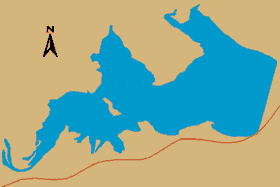Fishing
- Possession and Transport of Exotic Aquatic Species
- Licenses & Regulations
- ShareLunkers
- Fish Identification
- Fish Consumption
- Texas Freshwater Fisheries Center
Water Resources
- Texas Reservoir Levels
- US Army Corps of Engineers
- Texas Water Issues
- Golden Alga
- Aquatic Vegetation
5325 North 3rd
Abilene, Texas 79603
(325) 692-0921
Michael Homer, Biologist
Nearby State Parks
- Abilene
150 Park Road 32
Tuscola, Texas 79562
(325) 572-3204
Lake Abilene
Quick Links: Fishing Regulations | Angling Opportunities | Cover & Structure | Tips & Tactics
Access is provided through Abilene State Park, which may be closed for wildlife management activities on occasion. Check the park web page for closure notices.
Lake Characteristics
Location: On Elm Creek 20 miles south of Abilene
Surface area: 595 acres
Maximum depth: 25 feet
Impounded: 1921
Water Conditions
Current Lake Level
Conservation Pool Elevation: 2,012 ft. msl
Fluctuation: Moderate, sometimes prone to long periods of dropping water levels
Normal Clarity: Very muddy
Reservoir Controlling Authority
Texas Parks & Wildlife Department
(325) 572-3204
Aquatic Vegetation
None
Predominant Fish Species
Lake Records
Stocking History
Latest Survey Report
Lake Maps
A contour map is available. Download the map or pick up a copy at the Abilene fisheries office, (325) 692-0921.
Fishing Regulations
Being located within a state park, this lake is regulated as a Community Fishing Lake.
Angling Opportunities
After several years of low water levels, this lake refilled in 2016 and has been restocked with game fishes. Boat access is highly dependent on water level. High to moderate levels bring fair to good fishing for catfish, crappie and largemouth bass. At low levels, bank fishing may be the only option and fishing success usually declines.
- Largemouth Bass
- Poor
- Catfish
- Poor
- Crappie
- Poor
- Sunfish
- Poor
Fishing Cover/Structure
When full, Lake Abilene can offer a variety of fishing cover including black willow trees, button bush, rocky structure, and dead terrestrial vegetation. Cover is primarily limited to brush piles and rocks when the reservoir is low. Fishiding fish habitat structures have been installed in the reservoir.
Use the Habitat Structure Viewer for an interactive map of fish habitat structures and downloadable GPS coordinates.
Tips & Tactics
Historically, flipping brushy cover for largemouth bass and crappie was a good technique, especially since the water is so muddy. Look for some good catfishing from the bank in the next couple of years as these fish take advantage of all the nutrients.
